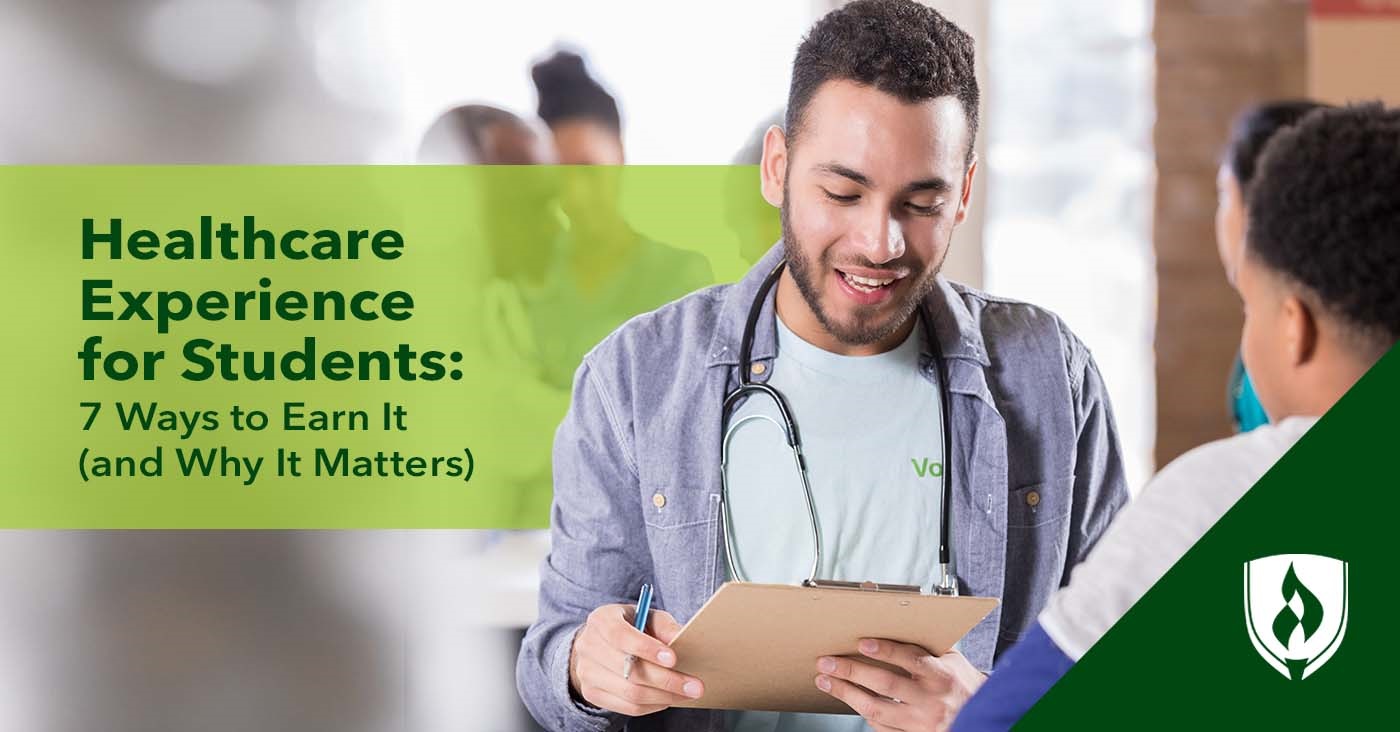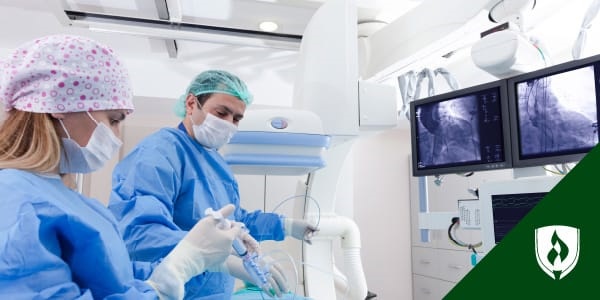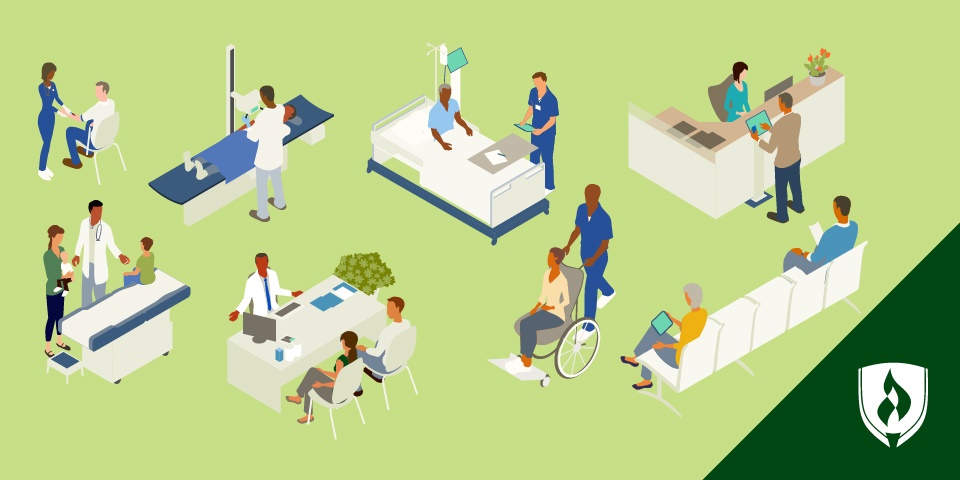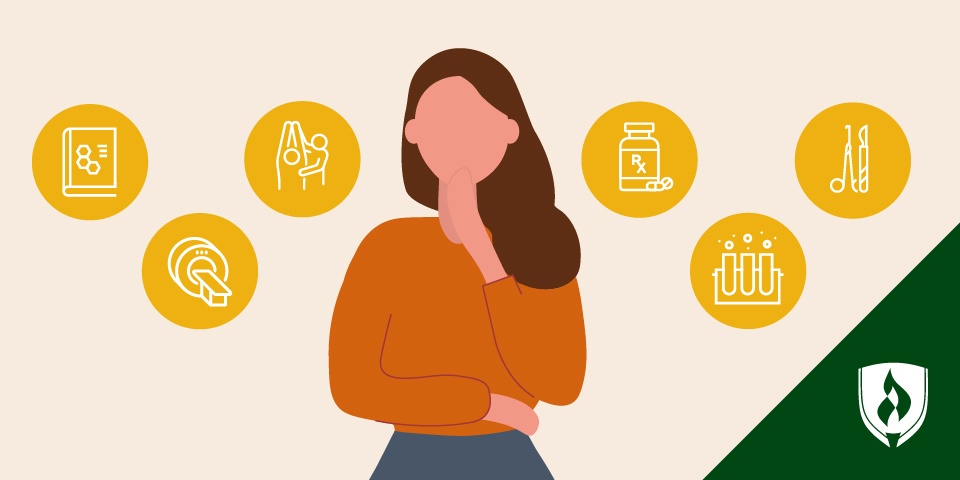Healthcare Experience for Students: 7 Ways to Earn It and Why It Matters
By Carrie Mesrobian on 03/21/2022

Interested in pursuing a healthcare-related degree program but are looking for some ways to build up your background knowledge and skills beforehand? You’re in the right place.
Building experience in healthcare-adjacent roles can be an extremely worthwhile use of your time. Depending on what you do, you may have a chance to make connections with local employers, get a feel for the day-to-day of the healthcare field, develop some basic patient care skills, round out your resume and even earn some money along the way!
To help get your gears turning, we’ve rounded up a list of several low- or no-barrier to entry roles and activities that can help you build meaningful healthcare experience.
7 Solid ways for students to build healthcare experience
1. Blood drives and other volunteer humanitarian work
What it is: Your local chapter of the American Red Cross® has many ways for you to gain healthcare experience. Serving as a volunteer with blood drives can be especially helpful because you can meet healthcare professionals, assist blood donors with paperwork and get a sense of the frontline medical needs in your community. There are many other Red Cross initiatives, including disaster response, which are always seeking volunteers. At the high school and college level, you can even start your own Red Cross Club to learn more about ongoing health and safety initiatives around the world.
Why it matters: You’ll gain first-hand experience while helping to address worthwhile causes like blood donation and other health and safety needs. This pursuit pairs the altruistic benefits of volunteer work with an opportunity to see first-hand how medical professionals interact with the public.
2. Working as a medical scribe
What it is: Recommended as a great introduction for those pursuing physician or nursing careers, medical scribe work is typically a paid position where you assist a physician in gathering patient information and documenting notes about an office visit or patient procedure. A type of dictation work that is a real time-saver for doctors, medical scribes can work in-person or remotely to ensure that each patient interaction is properly recorded. This role lets doctors focus more completely on patient care, as they’ve got someone else transcribing all the key notes.
Why it matters: You’ll personally see what a workday is like for a physician, as well as get a practical view of what types of problems patients present with and what treatments are used in a variety of circumstances. This can also provide you with a starting point for building a connection to local healthcare providers.
3. Non-medical jobs in healthcare settings (transport, food service, etc.)
What it is: Many healthcare pros first cut their teeth in the field by doing jobs in hospitals or other healthcare facilities that aren’t direct medical or patient care. This can include working as part of the housekeeping staff, food service staff or as a patient transport. These jobs give you a sense of all the factors and players in a healthcare setting: how the building operates, what patients need, what doctors and nurses do, what safety and health protocols are required, and more. All of these jobs will likely require criminal background checks, immunizations and other health safeguards prior to starting.
Why it matters: You’ll get an instant read on whether working in a healthcare setting appeals to you. While you might have a mental picture of what working in a hospital or other healthcare facility would look like day-to-day, it’s no substitute for direct experience.
4. Resident assistant opportunities in long-term care facilities
What it is: Long-term care facilities, also known as nursing homes, are always looking for volunteers and entry-level assistants to help with residents. Both often assist with recreational or enrichment activities: board games, crafts, music, pet therapy. Resident assistants help patients with eating, personal care, dressing and bathing, as well as assisting nursing staff with care records and medication. Like non-medical healthcare roles, resident assistants also generally must pass criminal background checks and show proof of immunization and other health safeguards prior to starting.
Why it matters: You’ll gain direct knowledge of mobility concerns, safety requirements and mental and social needs in a medical setting while working directly with nurses, doctors and patients.
5. Working as a personal care assistant (PCA)
What it is: Similar to resident assistants, personal care assistants work with people with physical or mental challenges to help them with their daily life. Their clients may live in a group home setting, with their families or on their own. Dressing, bathing, eating and personal care may be part of the job, as well as assisting with transportation, grocery shopping, household chores or schoolwork assistance. PCAs also generally must pass criminal background checks and show proof of immunization prior to starting.
Why it matters: You’ll gain great perspective on how people with different abilities manage and navigate everyday life while helping them problem solve and pursue their interests.
6. Hospital volunteer
What it is: Though candy stripers and their distinct uniforms are a thing of the past, hospitals still seek volunteers to help keep things running smoothly. Volunteers can take on a wide variety of tasks like greeting visitors, assisting information desk staff, providing directions and more. These volunteer roles often involve orientation training, passing a criminal background check and proof of immunization and other health safeguards prior to starting.
Why it matters: You’ll gain direct knowledge of the flow of visitors, patients and staff in a hospital, as well as learn more about safety protocols and patient needs.
7. Volunteer firefighter and emergency response programs
What it is: Many fire departments and paramedic services providers have feeder volunteer programs that will train you in emergency response first aid. This is a practical training that is typically available at no cost. Volunteer opportunities vary, depending on the needs of the department, but some activities may be related to administrative support, fundraising, community outreach and safety education, while others might focus on emergency medical response, hazardous materials operations and search and rescue.
Why it matters: You’ll learn how to handle yourself in an emergency situation, get a real grasp of what people experiencing crisis need and gain an understanding of accident prevention.
Put your experience to good use
Now that you’ve learned some paths to jumpstarting your healthcare knowledge and skills prior to enrolling in a formal program, you might be ready to explore some of the career options available to you. Our article “Exploring 12 Healthcare Jobs You Can Launch in 2 Years or Less” highlights several excellent options for getting started sooner than later.
Related Articles:
- Remote Patient Monitoring and Its Impact in the Healthcare Field
- 8 Intriguing Allied Healthcare Careers to Consider
American Red Cross is a registered trademark of the American Red Cross.

-(1).png)


